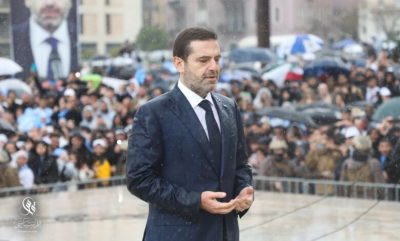Saad Hariri’s Return to Lebanon Tests the Waters for a Political Comeback

All Global Research articles can be read in 51 languages by activating the Translate Website button below the author’s name (only available in desktop version).
To receive Global Research’s Daily Newsletter (selected articles), click here.
Click the share button above to email/forward this article to your friends and colleagues. Follow us on Instagram and Twitter and subscribe to our Telegram Channel. Feel free to repost and share widely Global Research articles.
Big Tech’s Effort to Silence Truth-tellers: Global Research Online Referral Campaign
***
Valentine’s Day in the Arab world is called, Eid al Hob, translated into ‘Love Holiday’. When Former Prime Minister, Saad Hariri, returned to Beirut recently, his followers clearly showed their love of him in the hundreds as he prayed at his father’s grave on February 14.
Hariri’s father, Prime Minister Rafik Hariri, was assassinated on February 14, 2005 in Beirut.
Hairi founded the Future Movement party in 2007, and served as Prime Minister from November 9, 2009 to June 13, 2011. After three years abroad, he returned to Lebanon on August 8, 2014 and served a second term as Prime Minister from December 18, 2016 to January 21, 2020.
Hariri endorsed Michel Aoun as President in 2016, and this demonstrated Hariri was willing to make big compromises to ensure short-term political stability.
In November 2017, while on a visit to Saudi Arabia, he was detained by Saudi officials and forced to resign. However, Arab and Western leaders stepped in to negotiate his release and return to Lebanon. This was apparently a message from the Saudi leadership to Hariri of their displeasure at his compromise with the Iranian-backed resistance group, Hezbollah.
In 2019, protests began in Lebanon against the corrupt ruling elite. Lebanese currency has lost more than 90 percent of its value, leaving Lebanese families below the poverty line. A huge explosion in the port of Beirut in August 2020 killed more than 200 people, and most people blame the political elite for the reason no one has been held to account.
Hariri had a working relationship with Hezbollah as he balanced the views of the Sunni sect in Lebanon with the Shite sect, two of the three largest sects in Lebanon, but was never able to address the fundamental problems facing Lebanon.
On January 24, 2022 he announced that he had suspended his involvement in political activities and he did not run in the parliamentary elections on May 15, 2022.
“I am convinced that there is no room for any positive opportunity for Lebanon in light of Iranian influence, international confusion, national division, flaring sectarianism and the withering of the state,” Mr. Hariri said on TV. Since then, he has been living a private life in UAE.
Like his father, Hariri had a leadership vision that encouraged business, stayed close to the US and France, and maintained good relations with Saudi Arabia, where he was born, raised and holds citizenship.
On February 18, Mufti of the Lebanese Republic, Sheikh Abdul-Latif Derian, met with Hariri at Dar al-Fatwa, where they discussed the current situation in Lebanon, and ways of promoting the national morale.
At the Maison du Centre, Hariri met with former Parliamentary Vice-President Elie Ferzli, Aounist MP Alain Aoun, Marada leader and presidential candidate Sleiman Frangieh and his son, MP Tony Frangieh.
“In my opinion, Hariri’s return to political work has begun, and will be decisive,” said Ferzli.
Hariri also met privately with Speaker of the House Nabih Berri. Previously, he had met separately with the US Ambassador, Lisa Johnson, and Najib Mikati, the caretaker Prime Minister. Hariri also received other ambassadors based in Lebanon, including France’s Herve Magro and Egypt’s Ala’ Moussa.
Lebanon is a small country, but has been used as a place for regional powers to fight for control. From one side there is the US Embassy which tries to protect the interests of Israel, the neighbor to the south. Iran flexes its muscles through the support of Hezbollah, which provides the security of Lebanon’s southern border. Israel has invaded and occupied Lebanon in the past which left thousands dead, injured and imprisoned in the south. Israel continues to occupy Shebaa Farms in the south. The Lebanese Army is too weak to protect Lebanon from Israel because the US government refuses to give them the weapons and training they need. Also, there is the influence from France which has historical ties in Lebanon, including linguistic commonalities.
Can Hariri return to Lebanon and solve its many woes? It will take more than just one man to repair the economic scene, banking reforms, sectarian strife, and competing foreign pressures. Band-aids and stop-gap fixes will not be enough. Lebanon needs a vast systemic rehabilitation, and doesn’t even have an elected President yet.
While Hariri was in Beirut, groups marched in Tarik Jdeideh, a Sunni district of Beirut. Since then, he has traveled back to his home in UAE. His followers dubbed their support as the “March of the Return”, and perhaps Hariri will return in March, fulfilling their hopes and wishes for a new beginning.
*
Note to readers: Please click the share button above. Follow us on Instagram and Twitter and subscribe to our Telegram Channel. Feel free to repost and share widely Global Research articles.
This article was originally published on Mideast Discourse.
Steven Sahiounie is a two-time award-winning journalist. He is a regular contributor to Global Research.
Featured image is from MD

